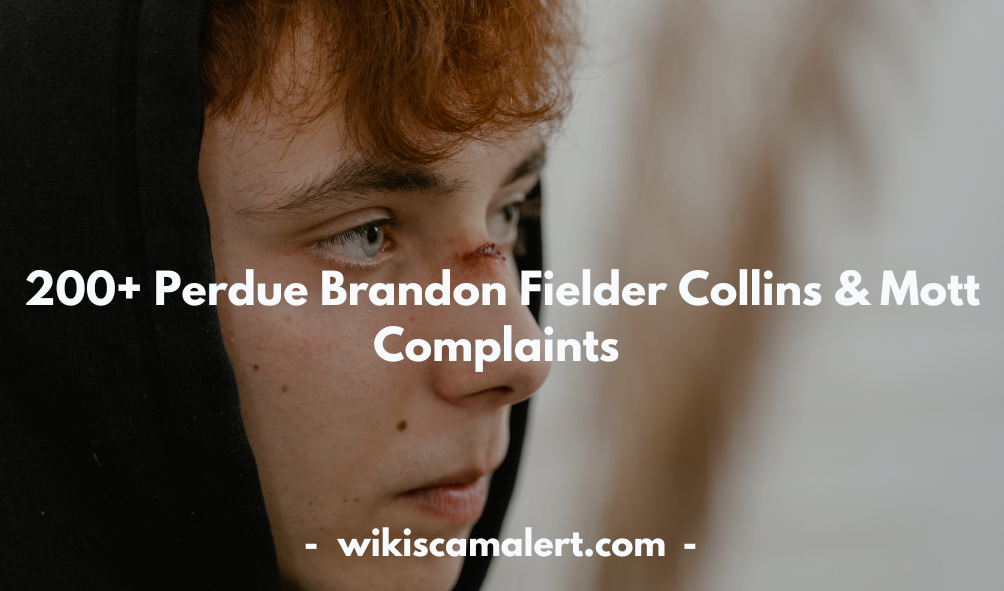Perdue Brandon Fielder Collins & Mott LLP is a well-known debt collection law firm. However, many consumers have raised concerns about whether their collection practices are legitimate or if they are involved in a scam. This article explores their operations, complaints, and whether you should be worried if you receive a letter from them.

Introduction to Perdue Brandon Fielder Collins & Mott Scam
- Perdue Brandon Fielder Collins & Mott LLP (PBFCM) is a law firm specializing in debt collection for government entities.
- Many individuals have raised concerns about their aggressive collection tactics.
- Some consumers report receiving collection letters for debts they do not owe.
- There are allegations of harassment and unfair practices.
- Online complaints suggest issues with inaccurate debt information.
- The firm has been involved in legal disputes related to their collection methods.
- Consumers have reported difficulties in verifying debts assigned to PBFCM.
- Some people claim they were threatened with lawsuits without proper verification.
- The company maintains that they operate within legal debt collection guidelines.
- Understanding the legitimacy of PBFCM is crucial for consumers facing debt collection.
Who is Perdue Brandon Fielder Collins & Mott LLP?
- PBFCM is a law firm that provides debt collection services for municipalities, schools, and government entities.
- Established in Texas, the firm has multiple offices across the state.
- Their primary function is to collect delinquent taxes, fines, and other public debts.
- They operate under state and federal laws governing debt collection.
- The firm has been in business for several decades.
- They work on behalf of local governments rather than private companies.
- PBFCM is known for taking legal action against debtors who fail to pay.
- The firm has mixed reviews, with some praising their professionalism and others criticizing their practices.
- They claim to follow all regulations set forth by the Fair Debt Collection Practices Act (FDCPA).
- Understanding their role can help consumers determine whether a collection notice from them is legitimate.
Understanding Debt Collection Agencies and Their Practices
- Debt collection agencies recover unpaid debts for creditors and institutions.
- Some debt collectors work directly for creditors, while others purchase debt portfolios.
- Collection agencies must adhere to laws like the FDCPA.
- Legitimate agencies provide written verification of debts before demanding payment.
- Unethical collectors may use threats, harassment, or misinformation.
- Some agencies report unpaid debts to credit bureaus, affecting credit scores.
- Consumers have the right to dispute debts and request validation.
- Debt collectors cannot call at odd hours or use abusive language.
- Legal action can be taken against agencies that violate debt collection laws.
- Knowing these practices helps consumers protect themselves from scams.
Why Are People Calling Perdue Brandon Fielder Collins & Mott a Scam?
- Some consumers report being contacted for debts they do not owe.
- There are allegations of aggressive and intimidating collection tactics.
- Some debt notices lack proper documentation or verification.
- Complaints suggest that PBFCM does not always respond to debt disputes.
- Reports indicate that PBFCM targets individuals with outdated or incorrect debt information.
- Some people claim they have been threatened with lawsuits over minor debts.
- Online reviews highlight dissatisfaction with PBFCM’s customer service.
- There have been cases where individuals were unaware of debts assigned to PBFCM.
- Legal actions have been filed against PBFCM for alleged unfair practices.
- While PBFCM is a real firm, its tactics lead some to question its legitimacy.
Common Complaints Against Perdue Brandon Fielder Collins & Mott LLP
- Reports of harassment and repeated phone calls.
- Allegations of attempting to collect debts that do not exist.
- Sending misleading or confusing collection letters.
- Failing to provide proper debt verification.
- Poor customer service and lack of response to disputes.
- Threatening legal action without proper grounds.
- Incorrect debt reporting that affects consumers’ credit scores.
- Difficulties in reaching a resolution with PBFCM representatives.
- Consumers claim they were pressured into making payments without proof of debt.
- Cases of mistaken identity leading to wrongful debt collection.
Perdue Brandon Fielder Collins & Mott Collection Letter Scam Explained
- Why People Suspect PBFCM’s Collection Letters Are a Scam – Many consumers report receiving debt collection letters they weren’t expecting, leading to suspicions of fraudulent activity.
- How PBFCM Contacts Consumers – The firm primarily reaches out via mail, phone calls, and sometimes emails to demand payment.
- Common Complaints About PBFCM Letters – Some people claim they received notices for debts they don’t recognize or have already paid.
- Tactics Used in Debt Collection Letters – These letters often include intimidating language, deadlines, and threats of legal action.
- How Scammers Impersonate PBFCM – Fraudsters sometimes mimic legitimate firms like PBFCM to deceive people into paying fake debts.
- What a Legitimate PBFCM Letter Looks Like – Genuine letters should include the creditor’s name, amount owed, and clear contact details.
- How to Verify If Your Collection Letter Is Real – Contact the original creditor to confirm if they have assigned PBFCM to collect the debt.
- Legal Requirements for Debt Collection Letters – Under the FDCPA, collection notices must include specific details, such as the right to dispute the debt.
- What to Do If You Receive a Suspicious Letter – Consumers should verify the debt, request validation, and report fraudulent letters to authorities.
- Steps to Take If You’ve Paid a Fake Collection Letter – Victims should immediately dispute the charge with their bank and file complaints with regulatory agencies.
How to Identify a Fake Debt Collection Letter from PBFCM
- Lack of Proper Creditor Information – A legitimate debt collection letter should clearly state the original creditor’s name.
- Suspicious Payment Methods – If the letter asks for payment via gift cards, wire transfers, or cryptocurrency, it’s likely a scam.
- Threats of Immediate Legal Action – Scammers often use extreme threats like “arrest warrants” or “immediate lawsuits” to pressure victims.
- Unverified Contact Information – Fake letters often list phone numbers or websites that don’t match PBFCM’s official contact details.
- Misspellings and Poor Grammar – Many scam letters contain typos and awkward phrasing, which is uncommon in legitimate legal correspondence.
- Request for Personal Information – Be cautious if a letter asks for sensitive details like your Social Security number or bank account info.
- No Debt Validation Option – Legitimate collectors must provide a way for you to dispute or validate the debt within 30 days.
- Unusual Sender Information – Verify that the letter comes from PBFCM’s official address and not a random P.O. Box.
- Check Online Complaints – Search for reviews or complaints about the letter’s sender to see if others have flagged it as fraudulent.
- Verify the Debt Through the Original Creditor – Always contact your original lender to confirm if PBFCM has the authority to collect the debt.
Is Perdue Brandon Fielder Collins & Mott LLP a Legitimate Firm?
- PBFCM’s Background and History – The firm has been operating for decades, primarily collecting debts for municipalities and government agencies.
- Government Contracts and Accreditation – PBFCM works with city governments, school districts, and counties to collect unpaid taxes and fines.
- Official Business Registration – The firm is registered as a legal entity in Texas and complies with state laws.
- Better Business Bureau (BBB) Rating – PBFCM has a profile on the BBB, though they have mixed customer reviews.
- Consumer Complaints About PBFCM – Despite being a legitimate firm, PBFCM has received complaints about aggressive collection tactics.
- Does PBFCM Follow the Fair Debt Collection Practices Act (FDCPA)? – While they are a licensed debt collection firm, some complaints suggest they have violated FDCPA rules.
- Has PBFCM Been Sued for Unfair Practices? – There have been lawsuits against PBFCM alleging harassment and wrongful collection attempts.
- Comparison With Other Debt Collection Agencies – PBFCM is one of many firms handling debt collections, but their tactics have raised concerns.
- Why Some People Believe PBFCM Is a Scam – Miscommunication, mistaken identity, and aggressive tactics make some people question the firm’s legitimacy.
- Final Verdict: Legitimate but Controversial – PBFCM is a real company, but their methods have led to skepticism and legal scrutiny.
Hidden Fees and Unfair Practices Reported by Consumers
- Unexpected Collection Fees – Some consumers report additional charges on top of their original debt.
- Inflated Interest Rates – PBFCM may add high interest rates, increasing the total amount owed.
- Failure to Notify Consumers of Debt – Some people claim they were never informed of their debt before collection attempts.
- Repeated Contact After Payment – Consumers have reported that PBFCM continues to reach out even after debts have been settled.
- Lack of Proper Debt Validation – Complaints include PBFCM failing to provide proof of the owed debt.
- Harassment Through Multiple Communication Channels – Some consumers receive excessive calls, emails, and letters.
- Misrepresentation of Legal Consequences – PBFCM has been accused of implying legal actions that they cannot take.
- Refusal to Work on Payment Plans – Some people claim PBFCM doesn’t offer flexible repayment options.
- Collection Attempts on Time-Barred Debts – Consumers have reported PBFCM attempting to collect on debts past the statute of limitations.
- Hidden Administrative Fees – Extra fees for processing payments or setting up payment plans have been reported.
Legal Rights of Consumers Against Debt Collectors
- Protection Under the Fair Debt Collection Practices Act (FDCPA) – This law restricts debt collectors from using deceptive or abusive tactics.
- Right to Request Debt Validation – Consumers can ask for written proof that they owe the debt before making payments.
- Time Limits on Debt Collection – Statutes of limitations prevent collectors from pursuing certain old debts.
- Restrictions on Communication – Debt collectors cannot call before 8 a.m. or after 9 p.m. without permission.
- Prohibition of Harassment or Threats – Consumers have the right to report any abusive language or threats.
- Ability to Dispute Incorrect Debt Claims – If a debt is inaccurate, consumers can challenge it and request corrections.
- Right to Cease Communications – Consumers can send a written request asking a debt collector to stop contacting them.
- Protection from Wage Garnishment Without Legal Action – Debt collectors must obtain a court order before garnishing wages.
- How to Report Violations – Consumers can file complaints with the FTC, CFPB, and state attorney general’s office.
- Seeking Legal Assistance – If a debt collector violates consumer rights, individuals can sue for damages.
How to Protect Yourself from Debt Collection Scams
- Verify the Debt – Always ask for a written validation notice before making any payments. Legitimate collectors must provide details of the debt.
- Check the Collector’s Credentials – Research the debt collector online, check the Better Business Bureau (BBB), and verify their licensing if required in your state.
- Never Share Personal Information – Scammers often ask for sensitive details like Social Security numbers, bank details, or credit card information. Legitimate agencies don’t need this to verify a debt.
- Know Your Rights Under the FDCPA – The Fair Debt Collection Practices Act (FDCPA) limits what collectors can do, including harassment, threats, or calling outside permitted hours.
- Beware of Threats and Urgency Tactics – Scammers often pressure victims into immediate payments by threatening lawsuits, wage garnishments, or even arrest—none of which are legal tactics.
- Request Written Proof – Ask for a formal letter detailing the debt. If they refuse, it’s likely a scam.
- Avoid Untraceable Payments – Scammers often request gift cards, wire transfers, or cryptocurrency payments. Legitimate agencies accept traditional payment methods.
- Check Your Credit Report – If a debt collector contacts you about a debt that’s not on your credit report, it could be fraudulent.
- Block Unwanted Calls and Emails – If you identify a scam, block the phone number and mark emails as spam to prevent further contact.
- Report Scammers – File a complaint with the Federal Trade Commission (FTC), Consumer Financial Protection Bureau (CFPB), or your state’s attorney general.
Steps to Take If You Believe You Are Being Scammed
- Do Not Panic or Act Impulsively – Scammers rely on fear tactics. Stay calm and take time to verify the claim before responding.
- Request a Debt Validation Letter – Legitimate collectors must send written proof of the debt within five days of initial contact.
- Contact the Original Creditor – If the collector claims to represent a company you owe money to, call the company directly to verify.
- Look for Red Flags – Signs of a scam include threats of arrest, refusal to provide written proof, and demands for untraceable payment methods.
- Keep Records of All Communication – Save emails, letters, and phone call logs in case you need to file a complaint or take legal action.
- Send a Cease-and-Desist Letter – If a collector is harassing you, legally request that they stop contacting you. They must comply under FDCPA laws.
- Monitor Your Credit Report – Unauthorized debt collection attempts could indicate identity theft. Check your credit for unfamiliar accounts.
- Consult a Consumer Protection Lawyer – If the collector is violating the law, an attorney can help you take legal action.
- Report Fraud to Authorities – File complaints with the FTC, CFPB, BBB, and state consumer protection offices.
- Warn Others About the Scam – Share your experience in online forums, consumer complaint sites, and with local consumer protection groups.
Legal Actions and Lawsuits Against Perdue Brandon Fielder Collins & Mott LLP
- Past Legal Complaints – Several individuals and businesses have filed complaints against PBFCM for aggressive debt collection tactics.
- Fair Debt Collection Practices Act (FDCPA) Violations – Some allegations include harassment, false debt claims, and failure to provide proper documentation.
- Better Business Bureau (BBB) Complaints – PBFCM has received multiple complaints on the BBB website regarding unethical collection practices.
- State Attorney General Investigations – Some states have looked into PBFCM’s practices following consumer reports of misconduct.
- Class-Action Lawsuits – Certain cases involve groups of consumers suing PBFCM for unfair collection practices.
- Settlements and Fines – In some cases, debt collectors, including PBFCM, have settled lawsuits by paying fines or issuing refunds to affected consumers.
- Consumer Financial Protection Bureau (CFPB) Reports – The CFPB database has records of complaints and actions taken against aggressive debt collectors.
- Court Rulings Against PBFCM – Some individuals have successfully won cases against PBFCM for improper debt collection practices.
- False Debt Claims Allegations – Some lawsuits involve consumers being pursued for debts they don’t actually owe.
- How to Join a Legal Case Against PBFCM – If you’ve been affected, you may be eligible to participate in ongoing lawsuits or file your own claim.
How to Negotiate Debt Settlement with PBFCM
- Verify the Debt First – Ensure the debt is legitimate and that PBFCM is legally allowed to collect it before negotiating.
- Understand Your Rights – Learn about FDCPA regulations and how they protect you during negotiations.
- Offer a Lump Sum Payment – Debt collectors often accept partial lump-sum payments in exchange for closing the debt.
- Request a Payment Plan – If you can’t afford a lump sum, negotiate an installment plan with reduced interest or fees.
- Get Everything in Writing – Never agree to a verbal settlement. Always request written confirmation before making payments.
- Negotiate a Pay-for-Delete Agreement – If the debt is on your credit report, you can request removal upon settlement. Not all collectors agree, but it’s worth asking.
- Do Not Admit Liability – If the debt is disputed, avoid statements that acknowledge full responsibility until you have proof.
- Check the Statute of Limitations – If the debt is too old, PBFCM may not legally be able to collect on it.
- Avoid Paying in Full Right Away – Instead, negotiate for a reduced amount or better repayment terms.
- Consider Hiring a Debt Settlement Lawyer – Professionals can handle negotiations and ensure your rights are protected.
Perdue Brandon Fielder Collins & Mott vs. Other Debt Collection Agencies
- Aggressiveness of Collection Practices – PBFCM is known for its strong collection tactics, similar to agencies like Midland Credit Management and Portfolio Recovery Associates.
- Specialization in Government Debt – Unlike many agencies that collect private debts, PBFCM primarily focuses on taxes, municipal fines, and public debts.
- Consumer Complaints Comparison – PBFCM has a high number of complaints, but so do other major collectors like Transworld Systems.
- Legal Issues and Lawsuits – PBFCM has faced legal challenges, but it’s not alone—several big collection agencies have been sued for unfair practices.
- Response Time to Consumer Disputes – Some consumers report slow or unhelpful responses from PBFCM compared to other agencies.
- Credit Report Impact – Like other agencies, PBFCM can negatively affect your credit score if they report debts to credit bureaus.
- Options for Debt Settlement – PBFCM may or may not offer better settlement options compared to agencies like National Debt Relief.
- Use of Robo-Calls and Automated Messaging – Some consumers report PBFCM using automated calls, a tactic also used by larger agencies.
- Public Perception and Online Reviews – PBFCM has mixed online reviews, with some consumers calling it predatory and others saying it followed legal processes.
- Ethical Concerns in Debt Collection – Many people criticize debt collectors for aggressive tactics, and PBFCM faces the same scrutiny as other agencies in this industry.
How to File a Complaint Against Unfair Debt Collection Practices
- Identify the Violation – Determine if the debt collector has violated the Fair Debt Collection Practices Act (FDCPA), such as harassment, false claims, or threats.
- Gather Evidence – Keep records of all communications, letters, emails, and phone call logs related to the collection agency.
- Send a Written Dispute – If the debt is inaccurate, request verification in writing within 30 days of receiving the collection notice.
- Contact the Original Creditor – Verify whether they authorized Perdue Brandon Fielder Collins & Mott LLP to collect the debt.
- File a Complaint with the Consumer Financial Protection Bureau (CFPB) – Submit your complaint online at the CFPB website.
- Report to the Federal Trade Commission (FTC) – The FTC investigates deceptive and unfair business practices by debt collectors.
- Complain to the Better Business Bureau (BBB) – While the BBB cannot take legal action, it can pressure the company to respond.
- Reach Out to Your State Attorney General – Some states have strict debt collection laws that go beyond federal regulations.
- Consult a Consumer Protection Attorney – If harassment continues, an attorney can help file a lawsuit against the agency.
- Monitor Your Credit Report – Ensure the disputed debt is not reported incorrectly, as this can affect your credit score.
Impact of PBFCM Debt Collection on Credit Scores
- Debt Collection Accounts on Credit Reports – If Perdue Brandon Fielder Collins & Mott LLP reports a debt, it can lower your credit score significantly.
- Missed Payments and Credit Score Drops – A delinquent account in collections can stay on your credit report for up to seven years.
- How Collection Accounts Affect Loan Approval – Banks and lenders may see an outstanding collection as a red flag when reviewing loan applications.
- Settlement vs. Paying in Full – Settling a debt for less than the full amount may still negatively impact your credit, though less than non-payment.
- Removing Collections from Credit Reports – If the debt is paid or was reported incorrectly, you can dispute it with credit bureaus.
- Effect of Disputed Debt on Credit Score – If the debt is not verified, credit bureaus must remove it from your credit report.
- How Long PBFCM Collections Stay on Your Credit Report – A collection can remain for up to seven years, even if paid.
- Improving Your Credit Score After Collections – Paying off outstanding debts and maintaining positive financial habits can help rebuild credit.
- Negotiating with PBFCM for “Pay-for-Delete” Agreements – Some collectors agree to remove the debt from credit reports upon payment.
- Legal Action to Remove Incorrect Debt Reports – If PBFCM falsely reports a debt, you can file disputes with credit bureaus and take legal action.
Consumer Reviews and Experiences with Perdue Brandon Fielder Collins & Mott LLP
- Mixed Customer Feedback – Some consumers report legitimate debt collection efforts, while others claim fraudulent practices.
- Reports of Harassment – Many complaints involve persistent calls, threats, and aggressive collection tactics.
- Wrong Debt Claims – Consumers have received collection letters for debts they do not owe.
- Lack of Verification – Some people report that PBFCM does not provide proper documentation when requested.
- Unfair Legal Actions – Some lawsuits have been filed against PBFCM for wrongful collections and misrepresentation.
- Communication Issues – Many complaints highlight difficulty in reaching PBFCM representatives for clarifications.
- Pressure to Pay Without Proof – Some consumers allege that PBFCM demands immediate payment without validating the debt.
- Collection of Time-Barred Debts – Reports suggest that PBFCM attempts to collect debts beyond the statute of limitations.
- Positive Reviews from Legitimate Debtors – Some individuals acknowledge PBFCM’s professionalism when handling real debts.
- How Consumers Can Protect Themselves – Being informed about debt collection laws and verifying debt legitimacy is key.
What Government Agencies Say About PBFCM Debt Collection
- Consumer Financial Protection Bureau (CFPB) Complaints – The CFPB has received numerous complaints about PBFCM’s collection practices.
- Federal Trade Commission (FTC) Regulations – The FTC enforces the FDCPA, which PBFCM must comply with to operate legally.
- State Attorney General Investigations – Some states have investigated PBFCM for potentially unfair debt collection tactics.
- Better Business Bureau (BBB) Rating – PBFCM has a mixed BBB rating, with complaints regarding aggressive collections.
- Lawsuits Filed Against PBFCM – Government records indicate lawsuits related to consumer rights violations.
- Legal Compliance Audits – Some regulatory bodies have reviewed PBFCM’s collection methods for compliance with federal laws.
- State-Specific Collection Laws – Different states have stricter rules that PBFCM must adhere to.
- Fair Debt Collection Practices Act (FDCPA) Oversight – PBFCM must follow FDCPA guidelines to avoid penalties.
- Local Consumer Protection Agencies’ Role – These agencies help consumers report and fight unfair debt collection.
- Regulatory Warnings Against Unfair Practices – Some agencies have issued advisories about dealing with aggressive collectors like PBFCM.
Final Verdict: Is Perdue Brandon Fielder Collins & Mott LLP a Scam or Legit?
- Legally Recognized but Controversial – PBFCM is a legitimate firm but faces accusations of aggressive collection tactics.
- Consumer Complaints Raise Concerns – Many individuals report harassment, misrepresentation, and collection of inaccurate debts.
- Legal Actions Suggest Ethical Issues – Multiple lawsuits indicate potential violations of fair debt collection laws.
- Debt Collection is Legal, But Methods Matter – While PBFCM is authorized to collect debts, their approach often comes under scrutiny.
- Verification is Essential – Consumers should always verify debts before making payments.
- Regulatory Oversight Exists – PBFCM operates under FDCPA regulations, but enforcement varies.
- How Consumers Can Protect Themselves – Knowing your rights and disputing inaccuracies is crucial.
- PBFCM’s Reputation is Mixed – Some people report fair treatment, while others claim fraudulent behavior.
- Avoiding Debt Collection Scams – Ensure any debt collector contacting you is legitimate before providing personal information.
- Final Advice: Proceed with Caution – While PBFCM is not an outright scam, their aggressive practices warrant vigilance and due diligence.
Steps to Take If You Believe You Are Being Scammed
If contacted about a suspicious debt, verify with the original lender, avoid immediate payment, and report concerns to authorities.
How to Negotiate Debt Settlement with Perdue Brandon Fielder Collins & Mott LLP
If you owe money, you may be able to negotiate a reduced payment or a payment plan.
Conclusion
While PBFCM is not an outright scam, its tactics raise significant concerns that consumers should be aware of. Many individuals have reported aggressive debt collection practices, misleading communication, and a lack of clarity regarding the validity of debts. These concerns highlight the importance of staying informed and taking the necessary precautions when dealing with debt collectors.
Consumers should always verify any debt they are contacted about before making payments. This includes requesting official documentation that proves the legitimacy of the debt and ensuring that the amount being demanded is accurate. Under the Fair Debt Collection Practices Act (FDCPA), individuals have the right to dispute any debt they believe to be incorrect or fraudulent. Taking advantage of these protections can help prevent consumers from falling victim to unfair or deceptive collection practices.
FAQs
How can I tell if a debt collection letter from Perdue Brandon Fielder Collins & Mott LLP is real?
Verify with the original creditor and check PBFCM’s legitimacy online.
Can I ignore a collection letter from this company?
Ignoring it may lead to legal action. It’s best to dispute it if the debt is incorrect.
What should I do if I am being harassed by a debt collector?
Report them to the Consumer Financial Protection Bureau (CFPB).
Is it possible to negotiate a lower settlement with this firm?
Yes, many debt collectors accept partial payments as settlements.
How do I report an unfair debt collection practice?
File a complaint with the FTC or CFPB.










